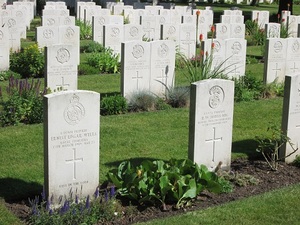 First World War graves at Brookwood Cemetery (photo by John Castle)
First World War graves at Brookwood Cemetery (photo by John Castle) Why should we remember the First World War? If for no other reason than the salutory reminder it gives us that there is nothing glamorous about war. It brings untold misery, and threatens to dehumanise not only the enemy but everyone who takes part. A moment's reflection should make us link the stories of past conflicts with the reality of wars that are being waged today. In the face of such suffering, we can either block them out of our minds, or, like some of the characters in War Horse, respond with an act of gratuitous kindness, perhaps by making a donation to a charity that helps the victims, or by showing compassion to someone around us who needs help or encouragement. In so doing, we will follow the example of the Son of God, whose response to the misery of human sin and suffering was to become one of us, and through his own suffering bring life and hope.
 RSS Feed
RSS Feed